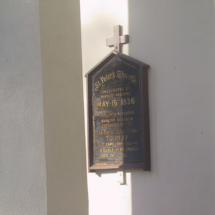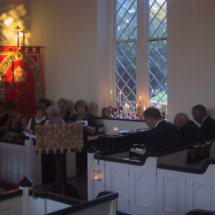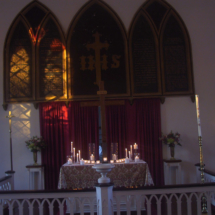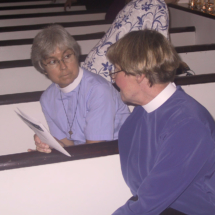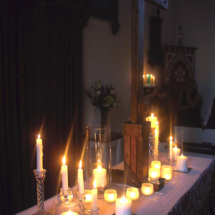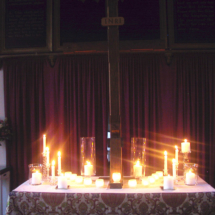Click here to view in a new window.
2022 Sun Sept 11
Remembering 9/11 in 2016

Come Back Home!
Evening Prayer, 6pm Sun., Sept. 11, 2016

We offer a service of Evening Prayer Sunday 6pm for those who served and those who gave their lives 15 years ago on 9/11.
This is a short but important service. Here’s the bulletin.
Rev. Gary Jones of St. Stephens in Richmond wrote about 9/11 wrote about the positives from the even
“At times like this, it’s as if we become like the prodigal son. We come to ourselves, we remember our true life, and we know we need to go back home. And that is certainly what happened 15 years ago. A nation deeply divided by a bitterly contested presidential election came together in an extraordinary show of unity. It was as if we woke up and came to ourselves. We returned to prayer, and we recovered a sense of unity, kindness, and compassion. We realized then what we from time to time remember now, that it shouldn’t take a tragedy to awaken this spirit in us.” “
There is certainly a solemnity about this anniversary, but there is also a bright and hopeful reminder of our potential – there is a light within us all that is simply waiting to be uncovered. Many of us have poignant memories of 9/11. One of mine is a gathering of 300 beaming little girls – singing, praying, hugging, and finally giggling with delight as they waved goodbye after chapel. Nine-eleven reminds me, “The light shines in the darkness, and the darkness did not overcome it.”
Review the 10th anniversary remembrance.
Lectionary, Sept 11, 2022 – Pentecost 17, Year C
I. Theme – Punishment and Grace

The lectionary readings are here or individually:
First Reading – Exodus 32:7-14
Psalm – Psalm 51:1-11
Epistle – 1 Timothy 1:12-17
Gospel – Luke 15:1-10
Today’s readings praise God’s merciful pursuit of God’s people even as they sin. The readings contrast punishment and grace. In Exodus God forgives the Israelites’ spiritual impatience and lack of trust that lead them to turn from God to an idol . The Epistle and Gospel highlight God’s graceful care, which encompasses the lost and sinful. Paul offers himself as an example of one found by God, transformed by the power of God’s mercy. In the gospel, Jesus tells stories that illustrate God’s great joy over each sinner who repents.
If God’s grace welcomes back the apostle Paul, despite his persecution of early Christians, will it welcome back the wealthy whose largess has come at the expense of the poor. Grace transforms the past, and opens us to become new creations. We still may have to face the consequences of the past; but grace leads to new behaviors and openness to expanded divine possibilities for ourselves and the good Earth.
Jesus makes clear in the Gospel that everyone falls within the shadow of salvation, regardless of their past behavior and place in society. What Jesus is doing is placing worth and value on what others had deemed worthless. The Jewish mystical tradition proclaims that when you save one soul, you save the world. This wisdom provides a creative lens through which to read the parable of the lost sheep.
Each one of us is made in the image of God; therefore, each one of us is worthy. Because of that, we are valued. We belong to God. And God will seek us out to the ends of the earth as a lost sheep, into all the cracks and darkness and lonely, lost places as a lost coin. We are not forgotten to God, even when we fall into despair, into addiction, into hopelessness.
II. Summary
First Reading – Exodus 32:7-14
Exodus 32:7-14 is from our second thread of the readings this season, in which the theme of God fulfilling the covenantal promises made with the people prevails.
Early in their journey from slavery in Egypt to the promised Land, God’s people became restless and untrusting
When Moses led the Hebrew slaves out of Egypt, they did not go very long or very far before they lost confidence in Moses and in the path on which he was leading them. They were camped in the Sinai desert at the foot of a mountain, while Moses was up the mountain receiving extensive instructions from the Lord. The people grew restless, then nostalgic even for the ways of their Egyptian former masters. They melted jewelry and formed an idol (or a token of rebellion against Moses) from it in the shape of a calf, then worshiped it with exuberant ceremony. The golden calf would be followed as their god. Of course the Lord is outraged, and Moses has to intervene, reminding the Lord of the covenant, lest the Lord revoke it.
This reading begins a section on Israel’s sin and God’s forgiveness (chaps. 32–34). It serves both as a narrative sequel to the giving of the law on Mt. Sinai and as a spiritual reflection upon Israel’s repeated apostasy from the time of the exodus to the exile. The worship of the golden calf signified an adoption of the Canaanite rites of Baal. It may represent not a false god but a challenge to Moses as mediator between the people and God.
In view of the lord’s anger, Moses intercedes for the people. He reminds God that it was God’s actions that brought them out of slavery into the wilderness. He reminds the lord of the covenant that these are God’s own people, that God’s name is now bound up with theirs and that God had promised Abraham, not Moses, many descendants.
Moses uses Egypt in a unique way in his argument with G-d. “What will the Egyptians think?” And to this he adds significant names: Abraham, Isaac, and Israel (Jacob). To these God had made significant promises of continuity and a future
God changes God’s mind about destroying them all, remembering the covenant to Abraham and Sarah and to their descendants forever. Like wedding vows, God will be their God, through good times and bad, and will never abandon them completely or destroy them. Although Moses effectively ends the conversation with God’s repentance, he seems to be unable to answer to the evidence that God sets before him.
Psalm – Psalm 51:1-11
This is one of the great penitential psalms. The psalm’s title, added later, ascribes this psalm to David during the time of his repentance for the seduction of Bathsheba and the murder of her husband, Uriah (2 Samuel 11:1–12:25).
Psalm 51:1-10 is the opposite of Psalm 14: in this psalm, the singer acknowledges their own sin, their own turning away from God, and desires reconciliation and forgiveness and restoration. The singer famously asks for a new, clean heart, and a new and right spirit within them, to guide them on the path that leads to God.
The constant hope and the goal of the covenant people was to become a community in right relationship with God and one another. Sin was understood as whatever disordered relationships – it is everywhere and at every time. The psalmist seeks not merely the removal of guilt, but the restoration of a right relationship to God. Verse 4 does not exclude sin against one’s neighbor, for that was also understood as an offense against God because it broke down the covenant relationships desired by God.
The psalm also speaks to the ubiquity of God’s knowledge of us – in the hidden knowledge within us. In verse 9 we begin to feel relief. “Purge me with hyssop” refers to the priest’s sprinkling the people with the blood of the sacrifice, or as in Numbers 19:18-22, where it refers to cleansing with water. The point is made with both images – the psalmist seeks redemption and forgiveness, and it is given so that it can be heard and be the cause of praise. The verse regarding “the right spirit” might call us all back to creation again, where the Spirit reboots us into righteousness and holy living.
This psalm has a place in the Liturgy for Ash Wednesday, where it serves as a psalm underscoring the penitential nature of the day. The introduction to the psalm serves as a poignant notice as well:
Epistle- 1 Timothy 1:12-17
Paul enjoyed God’s mercy, and uses his experience as an example for potential believers.
This selection begins a seven-week series of readings from two letters traditionally attributed to St. Paul. 1 and 2 Timothy, along with Titus, are called the pastoral epistles because of their emphasis on the proper ordering of the administration and worship of the Church. Many scholars today believe that these letters were not written by Paul himself but by a later follower. Such an author may have pieced together some of Paul’s personal letters and added material that presented oral Pauline teaching which addressed later situations.
Today’s reading is a thanksgiving for Paul’s conversion, especially as it serves as a paradigm of God’s mercy in the conversion of all “sinners.” A phrase characteristic of Paul’s emphasis on tradition is “the saying is sure” (v. 15) indicating a quotation from familiar teaching or hymns.
The author intends for the reader/hearer to understand what Paul stood for, and to see in his own story, the story of Christ’s grace intended for them as well. The exaggerated list of vices that describe Paul’s former life (“blasphemer”, “persecutor”, and “man of violence”) is meant to highlight Paul’s message of grace, which is intended for the reader, ostensibly Timothy. Thus Paul serves as the primary example of grace that will abound in those who follow the Gospel of Jesus.
This passage is a beautiful statement of thanksgiving to Jesus who is the one who called the writer into this ministry, using him despite of, and because of, his faults and shortcomings to be a witness to God. Christ came into the world to save sinners. The writer is grateful for God’s blessings, grace and mercy, and that because of God’s grace and mercy the writer is able to use his whole life as a witness of Jesus Christ and of Christ’s faith and love.
The closing is very interesting and is perhaps the remains of an ancient doxology that was used in early Christian worship.
Gospel – Luke 15:1-10
Luke writes his gospel for a community undergoing transition. Jesus’ original followers were poor Jews. But now the situation shifts so that Luke’s audience is composed primarily of respectable people who have an annoying way of looking down on others for a variety of reasons.
Luke 15:1-10 contain the first two of three parables in this chapter—the most famous, the Parable of the Prodigal Son, is not included in the lectionary this time. But these first two parables of the Lost Sheep and the Lost Coin are also important. Here Jesus is gathered with both the sinners (tax collectors and their ilk) and the supposedly righteous (the Pharisees and the scribes). What Jesus does and says will come under the close scrutiny of both camps.
Jesus was eating with sinners, welcoming them, and that some of the religious leaders were complaining about it. In both of these parables, the protagonist pays attention to something that normally would be forgotten about soon after—a lost sheep, a lost coin. It would have been ridiculous to leave 99 sheep behind to go after one lost sheep. Losing just one was probably a miracle that you didn’t lose more. Same with losing a coin. If you lost a $100 bill but had 9 more of them, you might be a bit angry that you lost it, but you would get over it soon. You certainly wouldn’t be going out and inviting your neighbors to celebrate once you found it
Luke 15 describes God’s joy at homecoming of sinners. The trilogy of Luke describes three states of being lost: wandering off ignorantly, being lost in the shuffle, and choosing to go astray. None of these states is beyond God’s redemption. At any moment we can turn around to awaken to God’s grace
Jesus uses the unwearied search of a shepherd for a lost sheep or of a poor woman for a lost coin as an image for God’s unchanging love toward the sinner. God’s constant seeking-out of the lost is manifested in Jesus’ redeeming ministry. God’s love takes the initiative; the sinner’s response is repentance. But rejoicing is the central note of these parables, for there is no mention of penitence.
Like Nathan, who convinces David of his sinfulness, by getting him to identify with the poor neighbor of his story (see Psalm 51, above), so Jesus seeks to have the hearer, whether sinner or scribe, to identify with the one who has lost either sheep, coin, or son
There is also the connection in this parable to the others. The shepherd risks the flock, to some degree, by leaving them to find the lost sheep. But, perhaps more importantly, the ninety nine cannot be fully saved apart from the lost sheep. They will remain ninety nine and not experience the wholeness of the perfect number, one hundred. Salvation is relational; our salvation is connected to the well-being of others. We cannot be complete without the salvation of others. The joy of heaven is found in the welcoming home of every soul.
The two parables in today’s reading make the same point. They answer those who criticized Jesus for having any dealings with the outcast and despised. It was a strong ancient principle, especially among the Pharisees, that one should not associate with sinners. “Sinners” were both those who led immoral lives and those whose occupations were considered sure to lead them into immorality—tax collectors, shepherds, etc. “Sinners” could not hold office or act as legal witnesses.
Jesus makes clear that everyone falls within the shadow of salvation, regardless of their past behavior and place in society. What Jesus is doing is placing worth and value on what others had deemed worthless. The Jewish mystical tradition proclaims that when you save one soul, you save the world. This wisdom provides a creative lens through which to read the parable of the lost sheep.
Both parables speak to the implicit value of things. People—human beings, their very lives—are valuable to God, every single one. And when society starts saying you’re worthless, you might start believing it—and ending up in addiction, depressed, and feeling completely useless to the world. But Jesus says “You are valuable—You are precious to God.” Jesus would rather leave the 99 who know who they are to find the one that has been rejected and left for dead. Jesus would rather spend all the time looking to find one who was lost than to forget and move on. People are more valuable than lost coins or even lost sheep
Holy Cross Day, Sept 14
See Our Collection of Crosses

"O BLESSED Saviour, who by thy cross and passion hast given life unto the world: Grant that we thy servants may be given grace to take up the cross and follow thee through life and death; whom with the Father and the Holy Spirit we worship and glorify, one God, for ever and ever. Amen."
Holy Cross Day is Sept. 14 in honor of Christ’s self-offering on the cross for our salvation. The collect for Holy Cross Day recalls that Christ "was lifted high upon the cross that he might draw the whole world unto himself," and prays that "we, who glory in the mystery of our redemption, may have grace to take up our cross and follow him" (BCP, p. 192). The themes of Holy Cross Day are powerfully expressed by the hymn "Lift high the cross" (Hymn 473).
This day has been a part of the Eastern Church. The feast entered the Western calendar in the seventh century after Emperor Heraclius recovered the cross from the Persians, who had carried it off in 614, 15 years earlier. According to the story, the emperor intended to carry the cross back into Jerusalem himself, but was unable to move forward until he took off his imperial garb and became a barefoot pilgrim. It only has been celebrated in the Episcopal Church with the current prayer book
Origin of Sept 14 -During the reign of Constantine, first Roman Emperor to profess the Christian faith, his mother Helena went to Israel and there undertook to find the places especially significant to Christians. (She was helped in this by the fact that in their destructions around 135, the Romans had built pagan shrines over many of these sites.)
Having located, close together, what she believed to be the sites of the Crucifixion and of the Burial (at locations that modern archaeologists think may be correct), she then had built over them the Church of the Holy Sepulchre, which was dedicated on 14 September 335.
Forward Movement reported this:"During the construction, tradition says that fragments from the True Cross, that is, the cross on which Jesus had been crucified, were found. It sounds fanciful, and perhaps it is. What is not fanciful are the fervent prayers of pilgrims from around the world in that site every day."
Update for 2017 from Forward Movement: "Recently, the traditional site of Jesus’ burial and resurrection was renovated. During the construction, another miracle of sorts happened. It turns out that under more modern layers of marble, ancient, first-century stone was discovered. This is the latest in a series of archeological finds which support the idea that the Church of the Holy Sepulchre was built on the actual sites where the actual events of Good Friday and Easter Day took place. It is almost overwhelming."
It has become a day for recognizing the Cross (in a festal atmosphere that would be inappropriate on Good Friday) as a symbol of triumph, as a sign of Christ’s victory over death, and a reminder of His promise, "And when I am lifted up, I will draw all men unto me." (John 12:32)
The symbol
Paradoxically a symbol of suffering and defeat but also of triumph and salvation, the cross is the universal Christian symbol, acknowledged by all denominations as the single visual identifier of their faith.
History shows that the cross was used centuries before Christ. For example, in the British Museum is a statue of the Assyrian king Samsi-Vul, son of Shalmaneser, 800 years before Christ.
Early Christians used a wide variety of symbols to express their faith. The second-century Christian teacher Clement of Alexandria identified a dove, a fish, a ship, a lyre, and an anchor as suitable images to be engraved on Christians’ signet-rings (or seals). Archaeologists have discovered a gold finger-ring from the third or fourth century that depicts an anchor, cross, lamb, shepherd, dove, and the abbreviation for Christ.
One of the best known early Christian symbols, because of its modern revival, is the fish. Some early Christians made the Greek word for fish, ichthus, into an acronym for "Jesus Christ, God’s Son, Savior.The fish has plenty of other theological overtones as well, for Christ fed the 5,000 with 2 fishes and 5 loaves (a meal recapitulated in Christian love-feasts) and called his disciples "fishers of men." Water baptism, practiced by immersion in the early church, created a parallel between fish and converts.
Tertullian, a theologian writing at beginning of the third century, interpreted this practice as a symbol of baptism: "But we small fishes, named after our great ICHTHUS, Jesus Christ, are born in water and only by remaining in water can we live."
 The symbol of the anchor, with its crossbar, resembles a cross. An anchor and two fish (probably from the third century) occur together on a grave slab in the catacomb of Domitilla in Rome.
The symbol of the anchor, with its crossbar, resembles a cross. An anchor and two fish (probably from the third century) occur together on a grave slab in the catacomb of Domitilla in Rome.
Writings about the cross did begin as early as 150. Justin Martyr, a Christian apologist writing in the 150s–160s, argued that God had providentially put the shape of the cross in everyday objects, such as the masts of ships, tools like the plough and the axe, and the standards of Roman legions. Christians would often pray standing up with their arms stretched out in the form of a cross. As early as the 200s, Christians were making the sign of the cross with their hands. The cross was so important that pagans charged Christians with worshipping the cross.
 Early Christians took two abbreviations that occurred in non-Christian writings and gave them special meaning. The Greek letter tau (which looks like a plus sign or a T-shaped cross), with the vertical bar curled at the top to represent the letter rho (which looks like a P), was an abbreviation for words beginning tr. The tau was used in the Old Testament and was said to be the anticipation cross. This form of the cross was used by Egyptians and is proposed that this sign was made by the Egyptians on the "Lintel" in accordance with God’s command to save the first born from destruction. It is thus represented as meaning life.
Early Christians took two abbreviations that occurred in non-Christian writings and gave them special meaning. The Greek letter tau (which looks like a plus sign or a T-shaped cross), with the vertical bar curled at the top to represent the letter rho (which looks like a P), was an abbreviation for words beginning tr. The tau was used in the Old Testament and was said to be the anticipation cross. This form of the cross was used by Egyptians and is proposed that this sign was made by the Egyptians on the "Lintel" in accordance with God’s command to save the first born from destruction. It is thus represented as meaning life.

The tau-rho occurs in Christian writings dated 175 to 225 in the spelling of the Greek words for "cross" (stauros) and "crucify" (stauroo). Since Christians saw the tau as symbolizing a cross, the superimposed rho may have suggested the head of Christ, making the tau-rho the first visual representation of the crucifixion by Christians.

The second abbreviation Christians used was the chi-rho monogram, composed of the Greek letter chi (which has the shape of an X) intersected by the letter rho. It appears in Christian writings as an abbreviation for Christ (Christos). Chi and Rho are the first two letters in Christ’s name in Greek. In 312, according to the early Christian writer Lactantius, Emperor Constantine had the chi-rho marked on his soldiers’ shields as they marched on Rome; according to Eusebius, he had the emblem put on a military standard. After Constantine’s victory, the chi-rho cross, often combined with the letters alpha and omega, became the ubiquitous symbol of Christianity.
The use of the cross did not begin in significant numbers until the time of Constantine, three centuries after Christ.
Remembering 9/11 in 2011, tenth year anniversary

Both services at 11am and 7pm remembered 9/11 on its tenth anniversary. The Prayers of the People at 11am featured Bishop Shannon’s “Litany for the Tenth Anniversary of September 11, 2001, a part of the bulletin and the evening service used “The Litany of Remembrance” was written by The Reverend Thomas Weitzel, Evangelical Lutheran Church in America. We had 41 at the 11am service and 44 at the 7:30pm on a day with brilliant sunshine.
Christian education and the sermon came to grips with the concept of mercy and forgiveness from Matthew 18. As expressed in the sermon “forgiveness is a process, a long drawn out process if the hurt is deep enough. In the end, reaching a state of forgiveness in which I can let go and be free of the hurt I’ve suffered is finally an act of grace and mercy from God.” It is a decision to let go of resentment and thoughts of revenge and frees us from destructive feelings. It is not condoning, forgetting, giving in or reconciliation.
Forgiveness can lead to reconciliation but may not. Many of these concepts were taken from Father Frank Desiderio, a member of the Paulist religious order in the Catholic church, in a series of talks on forgiveness called “Letting Go: Five Steps to Forgiveness”
The evening service theme was from the Book of Lamentations:
“The steadfast love of the Lord never ceases, his mercies never come to an end;
They are new every morning; great is your faithfulness.
“The Lord is my portion,” says my soul, “therefore I will hope in him.”
The Lord is good to those who wait for him, to the soul that seeks him.
It is good that one should wait quietly for the salvation of the Lord.”
For the evening service, the church was bathed in candles provided by several members of the congregation including BJ, Terri, Elizabeth and Marilyn. Nancy and Brad teamed up for “Our Father Who Art in Heaven.” We would like to thank St. Asaph’s which provided an outstanding choir in support and for Rev. Bambi Willis’ homily on 9/11.
The outside featured luminaries lighting the way as the congregation departed in silence.
Evening Prayer thoughts from Sept 11, 2016

We offered a service of Evening Prayer Sunday 6pm in 2016 for those who served and those who gave their lives 15 years ago on 9/11.
This is a short but important service.
Rev. Gary Jones of St. Stephens in Richmond wrote about 9/11 wrote about the positives from the even
“At times like this, it’s as if we become like the prodigal son. We come to ourselves, we remember our true life, and we know we need to go back home. And that is certainly what happened 15 years ago. A nation deeply divided by a bitterly contested presidential election came together in an extraordinary show of unity. It was as if we woke up and came to ourselves. We returned to prayer, and we recovered a sense of unity, kindness, and compassion. We realized then what we from time to time remember now, that it shouldn’t take a tragedy to awaken this spirit in us.” ”
There is certainly a solemnity about this anniversary, but there is also a bright and hopeful reminder of our potential – there is a light within us all that is simply waiting to be uncovered. Many of us have poignant memories of 9/11. One of mine is a gathering of 300 beaming little girls – singing, praying, hugging, and finally giggling with delight as they waved goodbye after chapel. Nine-eleven reminds me, “The light shines in the darkness, and the darkness did not overcome it.”
10th Anniversary of 9/11 in 2011
in 2011, the 10th anniversary the day fell on Sunday and we had our regular 11 am service and then we joined with St. Asaphs in Bowling Green for a 7:30pm service, a service of Steadfast and Remembrance
The Prayers of the People at 11am featured Bishop Shannon’s “Litany for the Tenth Anniversary of September 11, 2001, a part of the bulletin and the evening service at 7:30am used “The Litany of Remembrance” was written by The Reverend Thomas Weitzel, Evangelical Lutheran Church in America.
Links
1. Bulletin. The image is from that service.
2. 11:00am Prayers of the People
3. Description
4 Sermon
Part of the sermon covered forgiveness and reconciliation
“I’d like to point out here the difference between forgiveness and reconciliation.
“Forgiving someone is something we choose to do. Desiderio says that forgiveness is a decision to let go of resentment and thoughts of revenge. We cancel the emotional debt the other person owes us to free ourselves from destructive feelings.
“As Christians, we decide to accept God’s grace of forgiveness and to extend it to others. We feel differently. We find ourselves praying for the person rather than wanting to get back at the person.
“Forgiveness is something we do regardless of whether or not the other person apologizes to us or changes, or feels remorse. Ultimately, forgiveness of the one who hurt us is something we do for ourselves.
“As Lynn McQuinn, who lost her husband on 9-11 says, “On the road to peace, we have to cross the bridge of forgiveness.” Each one of us makes a decision about whether or not we want to walk down the road to peace in our own lives, regardless of what the person who hurt us chooses.
“Reconciliation is a two way street. We can forgive the person who has hurt us without being reconciled to that person.
“For instance, forgiveness is NOT putting up with hurtful behavior, setting the reset button and returning to a situation in which we get hurt all over again.
“If the other person is not willing to be reconciled to us, then we might have to remove ourselves from the situation, because we have compassion for ourselves. So even as we forgive someone who injures and hurts us, we do not continue to accept abuse as part of forgiveness. “
Photos, Season of Creation II, Sept. 11, 2022
Pentecost 14, Sept 11, 2022(full size gallery)
Videos, Pentecost 14, Season of Creation II, Sept. 11, 2022
1. Opening Hymn – “Fairest Lord Jesus”
2. Hymn of Praise – “A Scottish Blessing”
3. Creation Collect
4. Gospel – Luke 15:1-10
5. Sermon
6. Offertory – “All Things Wise and Wonderful” – portion
7. Eucharistic Prayer – “We Give Thanks”
8. Hymn – “I sing the almighty power of God”
9. The Blessing
Tea to honor Alice Hughes, Sept 8, 2022
Tea, Sept. 8 2022(full size gallery)
11 ladies attended the tea to honor Alice, the wife of Rev. Tom Hughes, who is assisting in preaching and celebrating at St. Peter’s.
Lectionary Pentecost 17, Year C, Sept 11, 2022
I. Theme – Punishment and Grace

The lectionary readings are here or individually:
First Reading – Exodus 32:7-14
Psalm – Psalm 51:1-11
Epistle – 1 Timothy 1:12-17
Gospel – Luke 15:1-10
Today’s readings praise God’s merciful pursuit of God’s people even as they sin. The readings contrast punishment and grace. In Exodus God forgives the Israelites’ spiritual impatience and lack of trust that lead them to turn from God to an idol . The Epistle and Gospel highlight God’s graceful care, which encompasses the lost and sinful. Paul offers himself as an example of one found by God, transformed by the power of God’s mercy. In the gospel, Jesus tells stories that illustrate God’s great joy over each sinner who repents.
If God’s grace welcomes back the apostle Paul, despite his persecution of early Christians, will it welcome back the wealthy whose largess has come at the expense of the poor. Grace transforms the past, and opens us to become new creations. We still may have to face the consequences of the past; but grace leads to new behaviors and openness to expanded divine possibilities for ourselves and the good Earth.
Jesus makes clear in the Gospel that everyone falls within the shadow of salvation, regardless of their past behavior and place in society. What Jesus is doing is placing worth and value on what others had deemed worthless. The Jewish mystical tradition proclaims that when you save one soul, you save the world. This wisdom provides a creative lens through which to read the parable of the lost sheep.
Each one of us is made in the image of God; therefore, each one of us is worthy. Because of that, we are valued. We belong to God. And God will seek us out to the ends of the earth as a lost sheep, into all the cracks and darkness and lonely, lost places as a lost coin. We are not forgotten to God, even when we fall into despair, into addiction, into hopelessness.
II. Summary
First Reading – Exodus 32:7-14
Exodus 32:7-14 is from our second thread of the readings this season, in which the theme of God fulfilling the covenantal promises made with the people prevails.
Early in their journey from slavery in Egypt to the promised Land, God’s people became restless and untrusting
When Moses led the Hebrew slaves out of Egypt, they did not go very long or very far before they lost confidence in Moses and in the path on which he was leading them. They were camped in the Sinai desert at the foot of a mountain, while Moses was up the mountain receiving extensive instructions from the Lord. The people grew restless, then nostalgic even for the ways of their Egyptian former masters. They melted jewelry and formed an idol (or a token of rebellion against Moses) from it in the shape of a calf, then worshiped it with exuberant ceremony. The golden calf would be followed as their god. Of course the Lord is outraged, and Moses has to intervene, reminding the Lord of the covenant, lest the Lord revoke it.
This reading begins a section on Israel’s sin and God’s forgiveness (chaps. 32–34). It serves both as a narrative sequel to the giving of the law on Mt. Sinai and as a spiritual reflection upon Israel’s repeated apostasy from the time of the exodus to the exile. The worship of the golden calf signified an adoption of the Canaanite rites of Baal. It may represent not a false god but a challenge to Moses as mediator between the people and God.
In view of the lord’s anger, Moses intercedes for the people. He reminds God that it was God’s actions that brought them out of slavery into the wilderness. He reminds the lord of the covenant that these are God’s own people, that God’s name is now bound up with theirs and that God had promised Abraham, not Moses, many descendants.
Moses uses Egypt in a unique way in his argument with G-d. “What will the Egyptians think?” And to this he adds significant names: Abraham, Isaac, and Israel (Jacob). To these God had made significant promises of continuity and a future
God changes God’s mind about destroying them all, remembering the covenant to Abraham and Sarah and to their descendants forever. Like wedding vows, God will be their God, through good times and bad, and will never abandon them completely or destroy them. Although Moses effectively ends the conversation with God’s repentance, he seems to be unable to answer to the evidence that God sets before him.
Psalm – Psalm 51:1-11
This is one of the great penitential psalms. The psalm’s title, added later, ascribes this psalm to David during the time of his repentance for the seduction of Bathsheba and the murder of her husband, Uriah (2 Samuel 11:1–12:25).
Psalm 51:1-10 is the opposite of Psalm 14: in this psalm, the singer acknowledges their own sin, their own turning away from God, and desires reconciliation and forgiveness and restoration. The singer famously asks for a new, clean heart, and a new and right spirit within them, to guide them on the path that leads to God.
The constant hope and the goal of the covenant people was to become a community in right relationship with God and one another. Sin was understood as whatever disordered relationships – it is everywhere and at every time. The psalmist seeks not merely the removal of guilt, but the restoration of a right relationship to God. Verse 4 does not exclude sin against one’s neighbor, for that was also understood as an offense against God because it broke down the covenant relationships desired by God.
The psalm also speaks to the ubiquity of God’s knowledge of us – in the hidden knowledge within us. In verse 9 we begin to feel relief. “Purge me with hyssop” refers to the priest’s sprinkling the people with the blood of the sacrifice, or as in Numbers 19:18-22, where it refers to cleansing with water. The point is made with both images – the psalmist seeks redemption and forgiveness, and it is given so that it can be heard and be the cause of praise. The verse regarding “the right spirit” might call us all back to creation again, where the Spirit reboots us into righteousness and holy living.
This psalm has a place in the Liturgy for Ash Wednesday, where it serves as a psalm underscoring the penitential nature of the day. The introduction to the psalm serves as a poignant notice as well:
Epistle- 1 Timothy 1:12-17
Paul enjoyed God’s mercy, and uses his experience as an example for potential believers.
This selection begins a seven-week series of readings from two letters traditionally attributed to St. Paul. 1 and 2 Timothy, along with Titus, are called the pastoral epistles because of their emphasis on the proper ordering of the administration and worship of the Church. Many scholars today believe that these letters were not written by Paul himself but by a later follower. Such an author may have pieced together some of Paul’s personal letters and added material that presented oral Pauline teaching which addressed later situations.
Today’s reading is a thanksgiving for Paul’s conversion, especially as it serves as a paradigm of God’s mercy in the conversion of all “sinners.” A phrase characteristic of Paul’s emphasis on tradition is “the saying is sure” (v. 15) indicating a quotation from familiar teaching or hymns.
The author intends for the reader/hearer to understand what Paul stood for, and to see in his own story, the story of Christ’s grace intended for them as well. The exaggerated list of vices that describe Paul’s former life (“blasphemer”, “persecutor”, and “man of violence”) is meant to highlight Paul’s message of grace, which is intended for the reader, ostensibly Timothy. Thus Paul serves as the primary example of grace that will abound in those who follow the Gospel of Jesus.
This passage is a beautiful statement of thanksgiving to Jesus who is the one who called the writer into this ministry, using him despite of, and because of, his faults and shortcomings to be a witness to God. Christ came into the world to save sinners. The writer is grateful for God’s blessings, grace and mercy, and that because of God’s grace and mercy the writer is able to use his whole life as a witness of Jesus Christ and of Christ’s faith and love.
The closing is very interesting and is perhaps the remains of an ancient doxology that was used in early Christian worship.
Gospel – Luke 15:1-10
Luke writes his gospel for a community undergoing transition. Jesus’ original followers were poor Jews. But now the situation shifts so that Luke’s audience is composed primarily of respectable people who have an annoying way of looking down on others for a variety of reasons.
Luke 15:1-10 contain the first two of three parables in this chapter—the most famous, the Parable of the Prodigal Son, is not included in the lectionary this time. But these first two parables of the Lost Sheep and the Lost Coin are also important. Here Jesus is gathered with both the sinners (tax collectors and their ilk) and the supposedly righteous (the Pharisees and the scribes). What Jesus does and says will come under the close scrutiny of both camps.
Jesus was eating with sinners, welcoming them, and that some of the religious leaders were complaining about it. In both of these parables, the protagonist pays attention to something that normally would be forgotten about soon after—a lost sheep, a lost coin. It would have been ridiculous to leave 99 sheep behind to go after one lost sheep. Losing just one was probably a miracle that you didn’t lose more. Same with losing a coin. If you lost a $100 bill but had 9 more of them, you might be a bit angry that you lost it, but you would get over it soon. You certainly wouldn’t be going out and inviting your neighbors to celebrate once you found it
Luke 15 describes God’s joy at homecoming of sinners. The trilogy of Luke describes three states of being lost: wandering off ignorantly, being lost in the shuffle, and choosing to go astray. None of these states is beyond God’s redemption. At any moment we can turn around to awaken to God’s grace
Jesus uses the unwearied search of a shepherd for a lost sheep or of a poor woman for a lost coin as an image for God’s unchanging love toward the sinner. God’s constant seeking-out of the lost is manifested in Jesus’ redeeming ministry. God’s love takes the initiative; the sinner’s response is repentance. But rejoicing is the central note of these parables, for there is no mention of penitence.
Like Nathan, who convinces David of his sinfulness, by getting him to identify with the poor neighbor of his story (see Psalm 51, above), so Jesus seeks to have the hearer, whether sinner or scribe, to identify with the one who has lost either sheep, coin, or son
There is also the connection in this parable to the others. The shepherd risks the flock, to some degree, by leaving them to find the lost sheep. But, perhaps more importantly, the ninety nine cannot be fully saved apart from the lost sheep. They will remain ninety nine and not experience the wholeness of the perfect number, one hundred. Salvation is relational; our salvation is connected to the well-being of others. We cannot be complete without the salvation of others. The joy of heaven is found in the welcoming home of every soul.
The two parables in today’s reading make the same point. They answer those who criticized Jesus for having any dealings with the outcast and despised. It was a strong ancient principle, especially among the Pharisees, that one should not associate with sinners. “Sinners” were both those who led immoral lives and those whose occupations were considered sure to lead them into immorality—tax collectors, shepherds, etc. “Sinners” could not hold office or act as legal witnesses.
Jesus makes clear that everyone falls within the shadow of salvation, regardless of their past behavior and place in society. What Jesus is doing is placing worth and value on what others had deemed worthless. The Jewish mystical tradition proclaims that when you save one soul, you save the world. This wisdom provides a creative lens through which to read the parable of the lost sheep.
Both parables speak to the implicit value of things. People—human beings, their very lives—are valuable to God, every single one. And when society starts saying you’re worthless, you might start believing it—and ending up in addiction, depressed, and feeling completely useless to the world. But Jesus says “You are valuable—You are precious to God.” Jesus would rather leave the 99 who know who they are to find the one that has been rejected and left for dead. Jesus would rather spend all the time looking to find one who was lost than to forget and move on. People are more valuable than lost coins or even lost
Sunday links, Pentecost 14, Sept. 11, 2022

Collage from Sept. 4
Sept. 11, 11:00am – Holy Eucharist
Season of Creation 2, Sept 1 – Oct. 4
The choir was back this week and sang the offertory “All Things Wise and Wonderful.” We had 31 including 2 visitors.
The Season of Creation was sprinkled throughout the service from the Scottish Blessing to the Collect which was a Creation Collect, the Affirmation “preserve God’s creation for prosperity”, the Prayers of the People “We pray for the earth. As you seek out those who are lost, give us the grace to seek out what has been lost on this earth due to our greed and negligence” and Tom’s sermon.
Hildegard of Bingen (1098-1179) – musician, writer, prophetess – and saint

We celebrate Hildegard’s life on September 17.
Accounts written in Hildegard’s lifetime (1098-1179) and just after describe an extraordinarily accomplished woman: a visionary, a prophet (she was known as “The Sibyl Of The Rhine”), a pioneer who wrote practical books on biology, botany, medicine, theology and the arts. She was a prolific letter-writer to everyone from humble penitents looking for a cure for infertility to popes, emperors and kings seeking spiritual or political advice. She composed music and was known to have visions
Here is what Gay Rahn, former Associate Rector at St. George’s Fredericksburg, wrote about her several years ago – “Hildegard of Bingen was a twelfth-century mystic, composer, and author. She described the Holy One as the greening Power of God. Just as plants are greened, so we are as well. As we grow up, our spark of life continually shines forth. If we ignore this spark this greening power, we become thirsty and shriveled. And, if we respond to the spark, we flower. ”
“CreationTide” wrote the following “Her version of viriditas or greening might not be quite what we have in mind when we use green to refer to environment, but there is a lasting wisdom in seeing human health and wellbeing in the context of wider issues. Just as with gardening, health needs to be nurtured and balanced.”
Hildegard commanded the respect of the Church and political leaders of the day. She was a doer: she oversaw the building of a new monastery at Rupertsberg, near Bingen, to house her little community, and when that grew too large she established another convent in Eibingen, which still exists today (though the present building dates from 1904).
Hildegard was born in 1098 in Bermersheim, on the Rhine, the tenth child of a noble family. It was the custom to promise the tenth child to the Church, so at eight (or 14, accounts differ), Hildegard was sent to the isolated hilltop monastery of Disibodenberg in the care of an older girl, Jutta of Sponheim.
She spent nearly 40 years there with a handful of other women from noble families, each enclosed in a small stone cell, or “tomb”, in a confined area of the monastery away from the monks.
As abbess of this small community, Jutta instructed Hildegard in the Psalter, reading Latin and strict religious practices. In Jutta’s biography, written after her death by her secretary, the monk Volmar, we discover just how hard life was for the nuns.
A single window linked them to the outside world and they were allowed one meagre meal a day in winter and two in summer. They prayed at regular intervals throughout the day and night.
When Jutta died in 1136, Hildegard was appointed prioress and it was then that she started writing music for the first time, for her nuns to sing as part of the Divine Office. The only music teaching Hildegard had received from Jutta was instruction in singing and the duties of a choir nun.
But she had grown up hearing the chants of the Roman mass and she set her own vibrant, colourful verses to music to create antiphons, responses, sequences and hymns.
Hildegard had been having visions since she was a little girl – commentators today, including neurologist Oliver Sacks, suggest she may have been a migraine sufferer – but it was not until she was 42 that she had the courage to speak of them to her church colleagues.
“Heaven was opened and a fiery light of exceeding brilliance came and permeated my whole brain and inflamed my whole heart and my whole breast,” she wrote. A heavenly voice told her to share her insights with the world
A committee of theologians subsequently confirmed the authenticity of Hildegard’s visions, and a monk was appointed to help her record them in writing. The finished work, Scivias (1141–52), consists of 26 visions that are prophetic and apocalyptic in form and in their treatment of such topics as the church, the relationship between God and humanity, and redemption]
About 1147 Hildegard left Disibodenberg with several nuns to found a new convent at Rupertsberg, where she continued to exercise the gift of prophecy and to record her visions in writing.
A talented poet and composer, Hildegard collected 77 of her lyric poems, each with a musical setting composed by her, in Symphonia armonie celestium revelationum. There is also music drama, Ordo Virtutum, a morality play whose subject is the struggle between 17 Virtues and the Devil over the destiny of a female soul.
Hildegard’s “compositions” stand out from other liturgical music because of the almost improvisatory nature of her melodies: they are freer, more wide-ranging and elaborate than the simple, one-octave lines of contemporaries
Her numerous other writings include lives of saints; two treatises on medicine and natural history, reflecting a quality of scientific observation rare at that period; and extensive correspondence, in which are to be found further prophecies and allegorical treatises. She also for amusement contrived her own language. She traveled widely throughout Germany
Hildegard died in 1179 in the monastery she had founded at Rupertsberg, near Bingen.
Interest in Hildegard started to grow around the 800th anniversary of her death in 1979, when Philip Pickett and his New London Consort gave possibly the first English performances of four of Hildegard’s songs.
Her earliest biographer proclaimed her a saint, and miracles were reported during her life and at her tomb. However, she was not formally canonized until 2012, when Pope Benedict XVI declared her to be a saint through the process of “equivalent canonization,” a papal proclamation of canonization based on a standing tradition of popular veneration. Later that year Benedict proclaimed Hildegard a doctor of the church, one of only four women to have been so named.
Gay Rahn priest at St. George’s wrote the following about Hildegard – “Hildegard of Bingen was a twelfth-century mystic, composer, and author. She described the Holy One as the greening Power of God. Just as plants are greened, so we are as well. As we grow up, our spark of life continually shines forth. If we ignore this spark this greening power, we become thirsty and shriveled. And, if we respond to the spark, we flower. “
You can hear Hildegard’s works here:
Holy Cross Day, Sept. 14
See Our Collection of Crosses

“O BLESSED Saviour, who by thy cross and passion hast given life unto the world: Grant that we thy servants may be given grace to take up the cross and follow thee through life and death; whom with the Father and the Holy Spirit we worship and glorify, one God, for ever and ever. Amen.”
Holy Cross Day is Sept. 14 in honor of Christ’s self-offering on the cross for our salvation. The collect for Holy Cross Day recalls that Christ “was lifted high upon the cross that he might draw the whole world unto himself,” and prays that “we, who glory in the mystery of our redemption, may have grace to take up our cross and follow him” (BCP, p. 192). The themes of Holy Cross Day are powerfully expressed by the hymn “Lift high the cross” (Hymn 473).
This day has been a part of the Eastern Church. The feast entered the Western calendar in the seventh century after Emperor Heraclius recovered the cross from the Persians, who had carried it off in 614, 15 years earlier. According to the story, the emperor intended to carry the cross back into Jerusalem himself, but was unable to move forward until he took off his imperial garb and became a barefoot pilgrim. It only has been celebrated in the Episcopal Church with the current prayer book
Origin of Sept 14 -During the reign of Constantine, first Roman Emperor to profess the Christian faith, his mother Helena went to Israel and there undertook to find the places especially significant to Christians. (She was helped in this by the fact that in their destructions around 135, the Romans had built pagan shrines over many of these sites.)
Having located, close together, what she believed to be the sites of the Crucifixion and of the Burial (at locations that modern archaeologists think may be correct), she then had built over them the Church of the Holy Sepulchre, which was dedicated on 14 September 335.
Forward Movement reported this:”During the construction, tradition says that fragments from the True Cross, that is, the cross on which Jesus had been crucified, were found. It sounds fanciful, and perhaps it is. What is not fanciful are the fervent prayers of pilgrims from around the world in that site every day.”
Update for 2017 from Forward Movement: “Recently, the traditional site of Jesus’ burial and resurrection was renovated. During the construction, another miracle of sorts happened. It turns out that under more modern layers of marble, ancient, first-century stone was discovered. This is the latest in a series of archeological finds which support the idea that the Church of the Holy Sepulchre was built on the actual sites where the actual events of Good Friday and Easter Day took place. It is almost overwhelming.”
It has become a day for recognizing the Cross (in a festal atmosphere that would be inappropriate on Good Friday) as a symbol of triumph, as a sign of Christ’s victory over death, and a reminder of His promise, “And when I am lifted up, I will draw all men unto me.” (John 12:32)
The symbol
Paradoxically a symbol of suffering and defeat but also of triumph and salvation, the cross is the universal Christian symbol, acknowledged by all denominations as the single visual identifier of their faith.
History shows that the cross was used centuries before Christ. For example, in the British Museum is a statue of the Assyrian king Samsi-Vul, son of Shalmaneser, 800 years before Christ.
Early Christians used a wide variety of symbols to express their faith. The second-century Christian teacher Clement of Alexandria identified a dove, a fish, a ship, a lyre, and an anchor as suitable images to be engraved on Christians’ signet-rings (or seals). Archaeologists have discovered a gold finger-ring from the third or fourth century that depicts an anchor, cross, lamb, shepherd, dove, and the abbreviation for Christ.
One of the best known early Christian symbols, because of its modern revival, is the fish. Some early Christians made the Greek word for fish, ichthus, into an acronym for “Jesus Christ, God’s Son, Savior.The fish has plenty of other theological overtones as well, for Christ fed the 5,000 with 2 fishes and 5 loaves (a meal recapitulated in Christian love-feasts) and called his disciples “fishers of men.” Water baptism, practiced by immersion in the early church, created a parallel between fish and converts.
Tertullian, a theologian writing at beginning of the third century, interpreted this practice as a symbol of baptism: “But we small fishes, named after our great ICHTHUS, Jesus Christ, are born in water and only by remaining in water can we live.”
 The symbol of the anchor, with its crossbar, resembles a cross. An anchor and two fish (probably from the third century) occur together on a grave slab in the catacomb of Domitilla in Rome.
The symbol of the anchor, with its crossbar, resembles a cross. An anchor and two fish (probably from the third century) occur together on a grave slab in the catacomb of Domitilla in Rome.
Writings about the cross did begin as early as 150. Justin Martyr, a Christian apologist writing in the 150s–160s, argued that God had providentially put the shape of the cross in everyday objects, such as the masts of ships, tools like the plough and the axe, and the standards of Roman legions. Christians would often pray standing up with their arms stretched out in the form of a cross. As early as the 200s, Christians were making the sign of the cross with their hands. The cross was so important that pagans charged Christians with worshipping the cross.
 Early Christians took two abbreviations that occurred in non-Christian writings and gave them special meaning. The Greek letter tau (which looks like a plus sign or a T-shaped cross), with the vertical bar curled at the top to represent the letter rho (which looks like a P), was an abbreviation for words beginning tr. The tau was used in the Old Testament and was said to be the anticipation cross. This form of the cross was used by Egyptians and is proposed that this sign was made by the Egyptians on the “Lintel” in accordance with God’s command to save the first born from destruction. It is thus represented as meaning life.
Early Christians took two abbreviations that occurred in non-Christian writings and gave them special meaning. The Greek letter tau (which looks like a plus sign or a T-shaped cross), with the vertical bar curled at the top to represent the letter rho (which looks like a P), was an abbreviation for words beginning tr. The tau was used in the Old Testament and was said to be the anticipation cross. This form of the cross was used by Egyptians and is proposed that this sign was made by the Egyptians on the “Lintel” in accordance with God’s command to save the first born from destruction. It is thus represented as meaning life.

The tau-rho occurs in Christian writings dated 175 to 225 in the spelling of the Greek words for “cross” (stauros) and “crucify” (stauroo). Since Christians saw the tau as symbolizing a cross, the superimposed rho may have suggested the head of Christ, making the tau-rho the first visual representation of the crucifixion by Christians.

The second abbreviation Christians used was the chi-rho monogram, composed of the Greek letter chi (which has the shape of an X) intersected by the letter rho. It appears in Christian writings as an abbreviation for Christ (Christos). Chi and Rho are the first two letters in Christ’s name in Greek. In 312, according to the early Christian writer Lactantius, Emperor Constantine had the chi-rho marked on his soldiers’ shields as they marched on Rome; according to Eusebius, he had the emblem put on a military standard. After Constantine’s victory, the chi-rho cross, often combined with the letters alpha and omega, became the ubiquitous symbol of Christianity.
The use of the cross did not begin in significant numbers until the time of Constantine, three centuries after Christ.
A Spiritual look at Climate Change
The ultimate test of a moral society is the kind of world that it leaves to its children.” –Dietrich Bonhoeffer
1. Creation is a reflection of the glory of God to be good stewards of God’s creation, which includes all of us who live within it
2. Climate change is a spiritual challenge. Handling climate change is part of how we live our faith.
3. We have a responsibility to care for the least of us. The poorest amongst us bear the greatest burden and risk of climate change.
4. We are called to respond to what we see around us. We are moral messengers for the common good, translate compassion into action.






